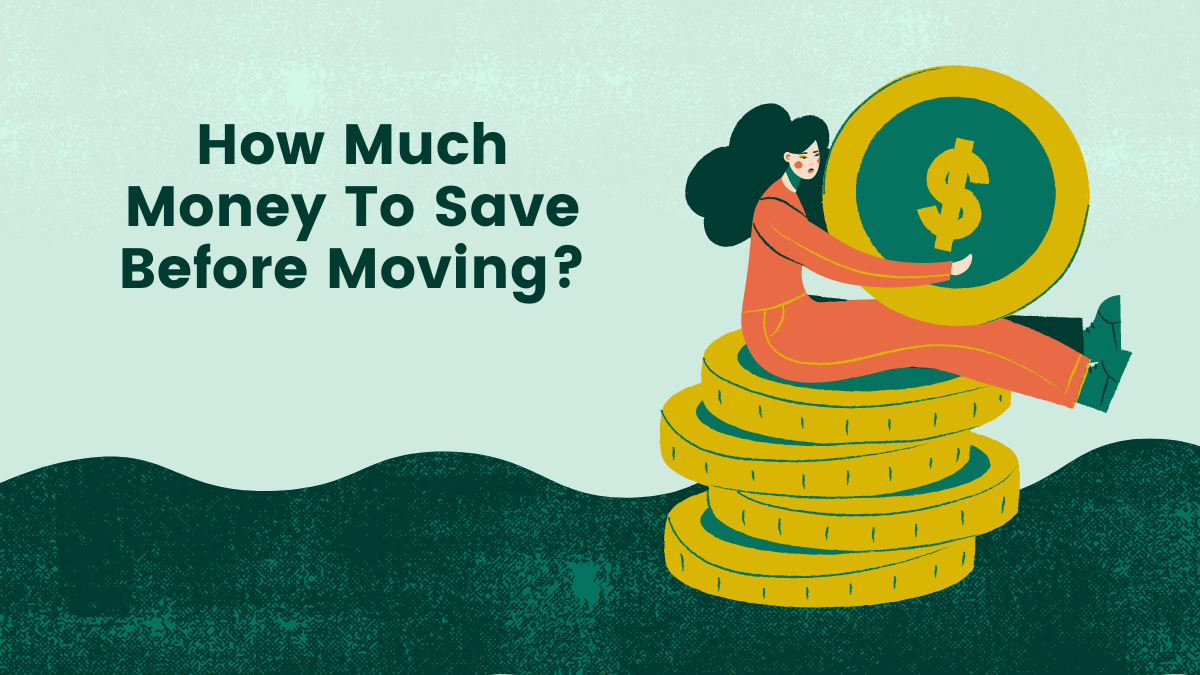How Much Money To Save Before Moving?
Are you dreaming of starting a new chapter in a different city or even across the globe? Moving to a new place is undeniably an exciting adventure, but it also comes with its fair share of challenges.
One question that often lingers in our minds is: how much money should I save before taking the leap? Whether you’re planning a local move or an international relocation, this blog post will guide you through the financial aspects of moving and help you determine just how much savings you’ll need to make your dream move a reality. So buckle up and get ready to calculate your moving budget.
Table of Contents

Tips For Money To Save Before Moving
If you are thinking of moving, it is important to start planning early in order to save money. Here are some tips on how much money you should save before moving:
- Estimate your current monthly expenses. This will help you figure out how much money you need to save each month in order to cover your costs while living away from home. Include items like rent, food, utilities, and other miscellaneous expenses.
- Compare prices for rental properties. Figure out which type of rental property would be the best option for you based on your budget and desired location. Use websites like Zillow or RentCafé to compare listings and find the best deal.
- Create a budget and stick to it. Creating a budget will help you stay focused on saving money while living away from home. Make sure to include all of your estimated expenses along with any extra money that may be available each month (i.e., saved-up vacation funds).
- Consider senior housing options. Many senior citizens prefer to live in retirement communities rather than move into an apartment or house alone. Seniors who live in retirement communities may have access to discounted rates and special amenities that appeal to them specifically, such as a pool or exercise room.
What is included in the calculation?
When you are considering whether or not to move, it is important to think about the costs associated with relocation. There are a number of costs that can be involved in moving, such as packing and shipping your belongings, hiring a moving company, and new housing costs. To figure out how much money you need to save before moving, you will need to calculate all of your estimated expenses.
Some basic costs to consider when calculating your savings before moving include:
- Packing and shipping materials: this can cost around $1,000 per person if you are doing it yourself.
- Hiring a moving company: this can cost around $3,000-$6,000 depending on the size of the move and the company you select.
- New housing costs: this can range from around $1,200-$2,500 per month depending on the location and size of the apartment or house.
Tips to save money before you move
One of the best ways to save money before you move is to create a budget. Set aside a certain amount of money each month for bills, groceries, and other expenses. When you have a budget in place, it will be easier to track your spending and make wise decisions about where to cut back.
Another way to save money before moving is to pack light. Don’t bring along items you don’t need or can’t use. This includes furniture, TVs, and other large items. Instead, pack lighter items like clothing, bedding, and kitchen appliances. This will both save money on shipping costs and reduce the amount of clutter that needs to be moved.
Consider using online resources to find housing and rental discounts in your new city. Many landlords offer discounts for first-time tenants or those who are willing to sign a longer lease. Use websites like RentCafé or VRBO to find offers from multiple landlords in your area.
How much can you save on a monthly basis?
Looking to save money on a monthly basis? Here are some tips:
- Consider bundling your utilities together. This will help you save money on your electric, water, and gas bills.
- Consolidate your debts into one loan. This will reduce the amount of interest you have to pay each month.
- Save up for a big purchase by putting away money each week. This will help you save up for something larger down the line.
- Create a budget and stick to it. This will help you stay on track and track your progress.
Calculate your moving budget
Moving is an expensive process, but it doesn’t have to be. You can save money by calculating your moving budget ahead of time. Here are some tips to help you calculate your moving budget:
- Figure out your total cost of the move. This includes the cost of the move itself, any associated fees, and any packing and shipping supplies you’ll need.
- Add in any special needs or expenses you may have, like storage costs for your belongings while you’re away or hiring a professional mover.
- Factor in how long the move will take. That includes the time necessary to pack and load your belongings onto transport vehicles, as well as unloading and setting up in your new home.
- Estimate how much money you’ll need to save up before moving. This will give you a ballpark figure for how much money you should expect to spend on your move itself.
What if you need more money to save?
If you need more money to save, here are five tips:
- Make a budget: Knowing how much money you’re spending each month is the first step to saving money. Create a budget and track your progress so you know where you stand.
- Cut expenses: There are many small expenses that can add up over time, such as eating out, cable TV, and rent. Find ways to cut back on your expenses, even if it means making some sacrifices.
- Invest in yourself: Investing in your education or skillset can make you more marketable in the future and allow you to save more money down the road. Also, consider contributing to retirement accounts or savings vehicles that offer higher returns over time.
- Consider getting a loan: Loans can be an affordable way to get started saving for the future, and there are many options available depending on your financial situation and needs. Compare interest rates and loans before deciding which option is right for you.
- Seek help from family or friends: Many people turn to friends and family members for help when they need financial assistance, especially during tough times like now. Ask if they would be willing to contribute towards a savings goal or loaned item of yours, and thank them for their support in times of need.
Pros and Cons of Money To Save Before Moving
Moving can be a daunting task, but it’s not impossible if you have the right tools and resources at your disposal. Here are some pros and cons to consider before packing your bags:
Pros of Moving with Money To Save:
- Less Stress: If you plan ahead, moving can be less stressful because you won’t have to scramble to come up with money in the middle of the move. You can save money by shopping for pre-packaged items or hiring a moving company.
- More Storage Space: Having extra money saved up will help you get more storage space in your new home or apartment. This is especially helpful if you’re moving into a smaller space or if you have a lot of sentimental items that you don’t want to lose.
- Fewer Problems on Move Day: By planning ahead, you will avoid any last-minute problems on move day. This means fewer wasted hours trying to figure out how to pay for services or scrambling to find boxes, packing materials, and other necessities.
- Reduced Stress After Moving: Once the big day arrives, knowing that you moved with money saved will put your mind at ease. You can relax knowing that all your important items are safe and sound and that there weren’t any unexpected costs along the way (like damage caused by draughts).
- Peace of Mind: Many people find that moving is one of the most stressful events in their lives. Having money saved up will help ease some of that pressure, and knowing that you don’t have to stress about finances during the move will also be a relief.
- More Flexibility: If you have some extra money saved up, you can use it to buy things you wouldn’t normally be able to afford on a tight budget, like furniture or appliances. This gives you more flexibility when making your new home feel like home.
- Reduced Hassle Later on: If everything goes according to plan and you don’t have any problems during the move, having money saved up will reduce the hassle and stress of having to finance your new home later on. This is especially helpful if you’re unlucky enough to experience a home emergency after moving in (like a water leak).
- Fewer Hidden Expenses: Moving can be expensive, and many people don’t realize all the little expenses that add up over time (like storage fees or moving supplies). Having extra money saved up can help avoid any unexpected costs, which will save you money in the long run.
- Greater Financial Flexibility: Having extra money saved up can give you more financial flexibility down the road. This means that you can use the cash to invest, pay off debt, or cover other unexpected costs.
- Increased Happiness: One of the most important benefits of moving is that it can increase your happiness. By working towards a goal and overcoming obstacles, you can achieve something that’s been eluding you for a while. Moving with money saved up can help you achieve this goal faster and easier than ever before.
The Cons of Moving with Money To Save:
- More Stress: Moving can be stressful, no matter how much money you have saved up. This is because there are always unforeseen costs that can crop up (like damage caused by a leak or theft).
- Increased Costs: If you don’t have enough money saved up, you will have to pay higher costs for moving services or supplies. This can add up quickly, and could ultimately result in a higher final cost for your move.
- Reduced Flexibility: If you don’t have enough money saved up, you will have to make do with less flexibility when it comes to your new home. You may not be able to buy the most expensive furniture or appliances, and you might have to settle for less space than you wanted.
- Home Emergency After Moving In: If something goes wrong during the move – like a water leak – having less money saved up can make resolving the problem more difficult. This is because you won’t have the funds available to fix the issue or replace any lost items.
- Greater Financial Risk: If you don’t have enough money saved up, your move could be more expensive in the long run. This is because you will have to pay for services or supplies that you would have been able to avoid if you had more money saved up.
- Increased Hassle: If something goes wrong during the move, having less money saved up can make resolving the problem more difficult. This is because you will have to pay for services or supplies that you would have been able to avoid if you had more money saved up.
Conclusion
When it comes to moving, there are a lot of factors to consider. From the cost of packing and shipping to the time required to prepare your new home – there is a lot to weigh before making that big decision. To help you get an idea of how much money you may need to save before making the move, we have put together a handy savings calculator.
Use this tool as a starting point and adjust it according to your specific circumstances. Once you know what you need to be saved up, it will be easier to make that final decision on where you would like to live.






